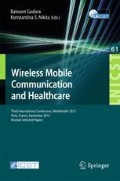Abstract
Smartphones are a promising channel for health promotion interventions. Mobile applications can track behaviour and provide real-time guidance and support. Research on mobile interventions has mainly focused on physical health and disease management, whereas promotion of mental well-being has received less attention. This paper presents results of a multidisciplinary expert review of twelve currently available mobile applications for mental well-being. The aim of the study was to identify what kinds of engaging and persuasive features are used in the applications and to assess how well the features were implemented. The expert reviews were carried out from user acceptance, mobile intervention design, and persuasive design points of view. Current applications were assessed moderately good from all three perspectives but improvement needs were identified in more versatile utilisation of mobile technology, leveraging social support, and providing a wider range of personalized intervention features.
Access this chapter
Tax calculation will be finalised at checkout
Purchases are for personal use only
Preview
Unable to display preview. Download preview PDF.
References
Atienza, A.A., Patrick, K.: Mobile Health: The Killer App for Cyber infrastructure and Consumer Health. American Journal of Preventive Medicine 40(5S2), 151–153 (2011)
Fogg, B.J.: Persuasive Technology. Using Computers to Change What We Think and Do, p. 318. Morgan Kaufmann, San Francisco (2003)
Patrick, K., Griswold, W.G., Raab, F., Intille, S.S.: Health and the Mobile Phone. American Journal of Preventive Medicine 35(2), 177–181 (2008)
Diener, E., Chan, M.Y.: Happy people live longer: Subjective well-being contributes to health and longevity. Applied Psychology: Health and Well-Being 3(1), 1–43 (2011)
Harrison, V., Proudfoot, J., Wee, P.P., Parker, G., Pavlovic, D.H., Manicavasagar, V.: Mobile mental health: Review of the emerging field and proof of concept study. J. Ment. Health 20(6), 509–524 (2011)
Mattila, E., Lappalainen, R., Pärkkä, J., Salminen, J., Korhonen, I.: Use of a Mobile Phone Diary for Observing Weight Management and Related Behaviours. Journal of Telemedicine and Telecare 16, 260–264 (2010)
Consolvo, S.E., Everitt, K., Smith, I., Landay, J.A.: Design Requirements for Technologies that Encourage Physical Activity. In: Proceedings of the SIGCHI Conference on Human Factors in Computing Systems, vol. 1, pp. 457–466. ACM, Montreal (2006)
Toscos, T., Faber, A., An, S., Gandhi, M.P.: Chick Clique: Persuasive Technology to Motivate Teenage Girls to Exercise. In: CHI 2006 Extended Abstracts on Human Factors in Computing Systems, pp. 1873–1878. ACM (2006)
Morris, M.E., Kathawala, Q., Leen, T.K., Gorenstein, E.E., Guilak, F., Labhard, M., Deleeuw, W.: Mobile Therapy: Case Study Evaluations of a Cell Phone Application for Emotional Self-awareness. Journal of Medical Internet Research 12(2), e10 (2010)
Fogg, B.J.: Creating Persuasive Technologies: An Eight-Step Design Process. In: Proceedings of Persuasive 2009, Claremont, California, USA, April 26-29 (2009)
Preece, J., Rogers, Y., Sharp, H., Benyon, D., Holland, S., Carey, T.: Human-Computer Interaction. Addison Wesley (1994)
Kaasinen, E.: User Acceptance of Mobile Services. International Journal of Mobile Human Computer Interaction 1(1), 79–97 (2009)
Honka, A., Kaipainen, K., Hietala, H., Saranummi, N.: Rethinking Health: ICT-Enabled Services to Empower People to Manage Their Health. IEEE Reviews in Biomedical Engineering 4 (2011)
Noar, S.M., Harrington, N.G., Van Stee, S.K., Aldrich, R.S.: Tailored health communication to change lifestyle behaviors. Am. J. Lifestyle Med. 5, 112–122 (2011)
Consolvo, S., McDonald, D.W., Landay, J.A.: Theory-driven design strategies for technologies that support behavior change in everyday life. In: CHI 2009 Proceedings, pp. 405–414 (2009)
WHO. Constitution of the World Health Organization, Basic Documents, 45th edn., Supplement (October 2006)
Hogan, B.E., Linden, W., Najarian, B.: Social support interventions: do they work? Clinical Psych. Rev. 22, 381–440 (2002)
Schubart, J.R., Stuckey, H.L., Ganeshamoorthy, A., Sciamanna, C.N.: Chronic health conditions and Internet behavioral interventions: a review of factors to enhance user engagement. CIN 29(2), 81–92 (2011)
Oinas-Kukkonen, H., Harjumaa, M.: Persuasive Systems Design: Key Issues, Process Model, and System Features. Communications of the Association for Information Systems 24, Article 28, 485–500 (2009)
Nawyn, J., Intille, S.S., Larson, K.: Embedding behavior modification strategies into a consumer electronic device: A case study. In: Dourish, P., Friday, A. (eds.) UbiComp 2006. LNCS, vol. 4206, pp. 297–314. Springer, Heidelberg (2006)
Langrial, S., Lehto, T., Oinas-Kukkonen, H., Harjumaa, M., Karppinen, P.: Native mobile applications for personal well-being: a persuasive systems design evaluation. In: The 16th Pacific Asia Conference on Information Systems, PACIS 2012 (2012)
Munson, S.: Beyond the share button: Making social network sites for health and wellness. IEEE Potentials, 42–47 (September/October 2011)
Author information
Authors and Affiliations
Editor information
Editors and Affiliations
Rights and permissions
Copyright information
© 2013 ICST Institute for Computer Science, Social Informatics and Telecommunications Engineering
About this paper
Cite this paper
Chang, TR., Kaasinen, E., Kaipainen, K. (2013). Persuasive Design in Mobile Applications for Mental Well-Being: Multidisciplinary Expert Review. In: Godara, B., Nikita, K.S. (eds) Wireless Mobile Communication and Healthcare. MobiHealth 2012. Lecture Notes of the Institute for Computer Sciences, Social Informatics and Telecommunications Engineering, vol 61. Springer, Berlin, Heidelberg. https://doi.org/10.1007/978-3-642-37893-5_18
Download citation
DOI: https://doi.org/10.1007/978-3-642-37893-5_18
Publisher Name: Springer, Berlin, Heidelberg
Print ISBN: 978-3-642-37892-8
Online ISBN: 978-3-642-37893-5
eBook Packages: Computer ScienceComputer Science (R0)

